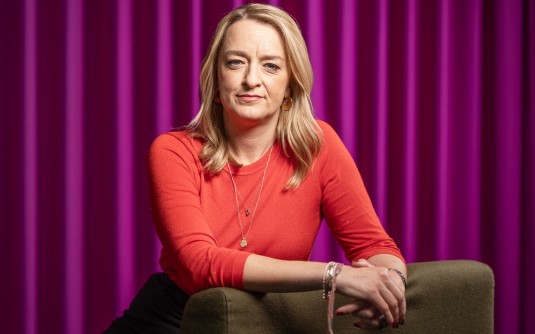
State of Chaos by the BBC's former politics editor was undoubtedly well-watched by everyone at Westminster. It promised to plunge deep into the mess of Brexit and its fallings outs to make sense of the near anarchy that characterised mainstream politics between 2016 and 2022. Promising insider access and never-before-seen interviews with movers, shakers, and bit-part players, did Laura Kuenssberg succeed?
No. Back in March last year, Patrick Howse wrote a blistering critique of her time at the helm. It wasn't that Kuenssberg was bad at her job, it's that her job was not what it should have been. I.e. reporting the news and holding politicians to account. Instead she acted as a relay. Kuenssberg has a nose for political gossip and ingratiated herself with Number 10 insiders, faithfully acting as a conduit for their framing of news stories. Boris Johnson's operation didn't need to establish a rapid rebuttal unit because Kuenssberg could be counted on to repeat whatever nonsense was texted her from the inside. Even if, as was the price for her closeness to Dominic Cummings, this meant regurgitating a complete pack of lies.
State of Chaos was true to Kuenssberg's signature style. There was never any hard questions asked of her interviewees. They were given plenty of space to explain themselves, which has its place. But in a documentary about how politics in this country went into meltdown? Considering how some of her talking heads played important roles in the dramas and behind-the-scenes shenanigans, simply allowing them to spin their own responses without question was a dereliction of political journalism.
I suppose it was to be expected. But this wasn't the only fatal flaw. Replicating standard practice of mainstream political comment and most academic politics coverage, State of Chaos caressed the surface of politics. There was no appreciation of why the Leave campaign won, why the British civil service famously did less contingency planning for Brexit than Japan, the character of the forces politicians pandered to, nor how the Tories were so successful in 2019. There was plenty of she-said he-said minutiae, confessions of plotting, and aspersions cast on the characters of ex-Prime Ministers. But why Theresa May framed Brexit in the hardest possible way when the referendum was won by a slight margin, why Boris Johnson bullishly bulldozed Brexit through all opposition, and why - in the last episode - Liz Truss crashed the economy were all questions that were never asked. What were the interests involved? What drove the crisis? Anyone wanting answers should look elsewhere.
But even more damning was the great unsaid. The so-called state of chaos of the documentary's title was as much a crisis of the Labour Party. Billed as an account of the shambles politics as a whole became, Labour and Jeremy Corbyn merited the briefest of mentions. There was no curiosity about how Labour managed to out-perform expectations in 2017, thereby accelerating Tory crisis. Why and how this was reversed two years later, nothing. It might as well have been natural forces or the politics gnomes at work. Nor were the severe divisions that paralysed the party paid any mind. You can't say this wasn't newsworthy or irrelevant. After all, the BBC's politics output and the "reporting" of Kuenssberg herself devoted to Labour between 2015 and 2019 amplified every lie to undermine its leadership, and helped deliver the party back safely into establishment hands. Its absence was an editorial oversight and nothing more, I'm sure.
State of Chaos failed as a portrayal of the recent political crisis, ignored a huge part of what happened, and reduced everything to the argy-bargy of dysfunctional personal relationships. In short, the "months and months" in the making turned out to be worse than a waste of time. It was a disgrace.
Image Credit
3 comments:
The full title of the programme was 'Laura Kuenssberg: State of Chaos'. Why is the BBC in such thrall to this one political reporter?
Well colour me utterly unsurprised...
Outside of the establishment bubble, Laura K garnered a bit of a reputation for being part of politics rather than a reporter on politics. Anyone else remember the 38 Degrees petition criticising her, which was emphatically shut down using questionable accusations of misogyny, backed by obvious establishment pressure...? Her brand of "reporting" suited the establishment bubble just fine, which is why she always got a free pass on its shortcomings - and also why a lack of actual journalism in her program hardly comes as a shock.
It was best summed up by the viral photo from a Labour event during the Corbyn era - actually at their manifesto launch for 2017, IIRC - where somebody held up a sign saying "fake news" behind her head...
I can't be bothered to watch it. The title alone tells you what it will be - an opportunity for Kuenssberg to show off how well connected she is. Look who I can get on screen! She was never interested in why or even how, only in what and who. The journalists number one question should always be why. Since politics is about people manoeuvring for (and, crucially) exploiting power, you can either look at it as a gossip columnist - who did what to whom, or as a proper investigative reporter - why and how they did it. The BBC lost interest in that when they realised that the government did not want people asking those sort of questions.
They treat Westminster as a sort of soap opera, rather than a puppet theatre - or perhaps it is more like a shadow theatre. Take it all at face value. Discuss how the shadows interact and report what they say, but never, ever ask, who or what is projecting those shadows, and why.
Post a Comment